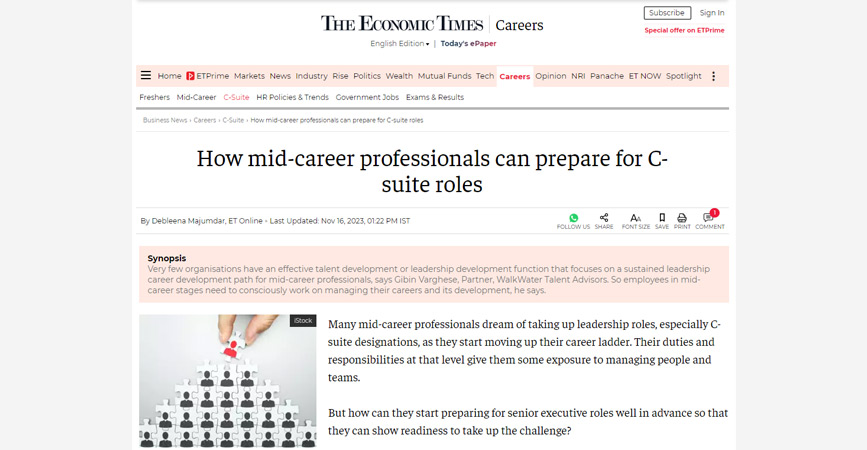
Synopsis: Very few organisations have an effective talent development or leadership development function that focuses on a sustained leadership career development path for mid-career professionals, says Gibin Varghese, Partner, WalkWater Talent Advisors. So employees in mid-career stages need to consciously work on managing their careers and its development, he says.
Many mid-career professionals dream of taking up leadership roles, especially C-suite designations, as they start moving up their career ladder. Their duties and responsibilities at that level give them some exposure to managing people and teams.
But how can they start preparing for senior executive roles well in advance so that they can show readiness to take up the challenge?
Very few organisations have an effective talent development or leadership development function that focuses on a sustained leadership career development path for mid-career professionals, says Gibin Varghese, Partner, WalkWater Talent Advisors. So employees in mid-career stages need to consciously work on managing their careers and its development, he says.
Key CXO competencies
A way to do this is to break up the skill requirements and focus on each area. Varghese lists the key competencies of CXOs regardless of their functional area as business acumen, strategic orientation, result orientation, change leadership, cross-functional collaboration and people leadership.
Nital Shah, Founder & COO of Uplers, names strategic thinking, effective communication and a results-oriented mindset as pivotal skills for CXO roles. “Mid-career professionals can hone these abilities by actively participating in strategic projects and delivering measurable outcomes.”
How skilling journey can start
A recent report, upGrad India Career Upskilling, said there was a difference in focus in skilling choices of companies and employees. Companies enable development of technical skills, industry-specific programmes, conferences and soft skills programmes; individuals focus more on certifications and online programmes. And these could be areas for mid-career professionals to hone their skills further on as well.

There are various ways for professionals to start preparing, including by participating in complex projects, and undergoing executive education, online learning and coaching.
Ways to upskill
Varghese says, “The first step is to assess one’s strengths with respect to the above competencies and map it to where it should be for the person to be a CXO. The second step is to address it with specific interventions, which could be in the shape of job rotation, stretch assignments, mentorship, leadership coaching and enrolling for leadership programmes at top universities. Most of the above interventions can be achieved within one’s current company or outside. Selecting a mentor or coach is a good starting point in the journey to become a CXO.”
Mid-career professionals aspiring for CXO roles must be intentional about it and strategically position themselves for success, says Shah. Embracing technology and building a personal brand through thought leadership further distinguish individuals in a competitive landscape.
Ultimately, the journey to a CXO role requires a blend of continuous learning, networking acumen, and a proactive commitment to leadership excellence. Remote work adds a twist to this growth because of the nuances that come with work-from-anywhere setup. But opportunities for growth are always available for the most enterprising people.
Shah says attending online courses, virtual conferences and industry webinars can foster a deep understanding of leadership principles and contemporary business trends. This will help candidates stay ahead of the curve.
Balaji Viswanathan, MD & CEO of consulting service provider Expleo India, says, “Continual learning is pivotal; keeping up with industry trends, market shifts, and emerging tech is non-negotiable. It not only demonstrates commitment but also arms you with the knowledge needed for strategic decision-making. Effective communication is another key. CXOs often represent the company, so being able to articulate a clear vision, inspire stakeholders and address challenges is crucial. Invest in refining your public speaking, writing and interpersonal skills.”
Apart from working on these skills, aspiring leaders should continuously meet and interact with other senior executives.
“Networking remains a linchpin in career advancement,” says Shah. “This becomes even more important with the advent of remote work models. Actively engaging with industry leaders on platforms like LinkedIn, participating in virtual events, and seeking mentorship create valuable connections that can provide insights and crucial guidance to get executive roles.
Collaborating across functions within a remote setting is equally vital, showcasing the ability to lead and influence teams across diverse environments.”
Other experts also highlight the importance of team management skills in senior roles. Aspiring leaders should realise that they will be responsible for many people.
“Mastering the art of nurturing a team is vital,” adds Vishwanathan of Expleo India. “As a C-suite executive, you’ll guide and develop your team to reach the company’s objectives. Cultivate strong leadership and mentoring skills, foster a collaborative culture, and encourage innovation among your team. Seek mentorship from current CXOs, expand your professional network, and explore executive education programmes to bridge knowledge gaps. Additionally, showcase your strategic thinking and problem-solving abilities in your current role to exhibit your potential as a future CXO. Remember, the path to a CXO role requires dedication, adaptability and a relentless pursuit of excellence.”
Source: The Economic Times








